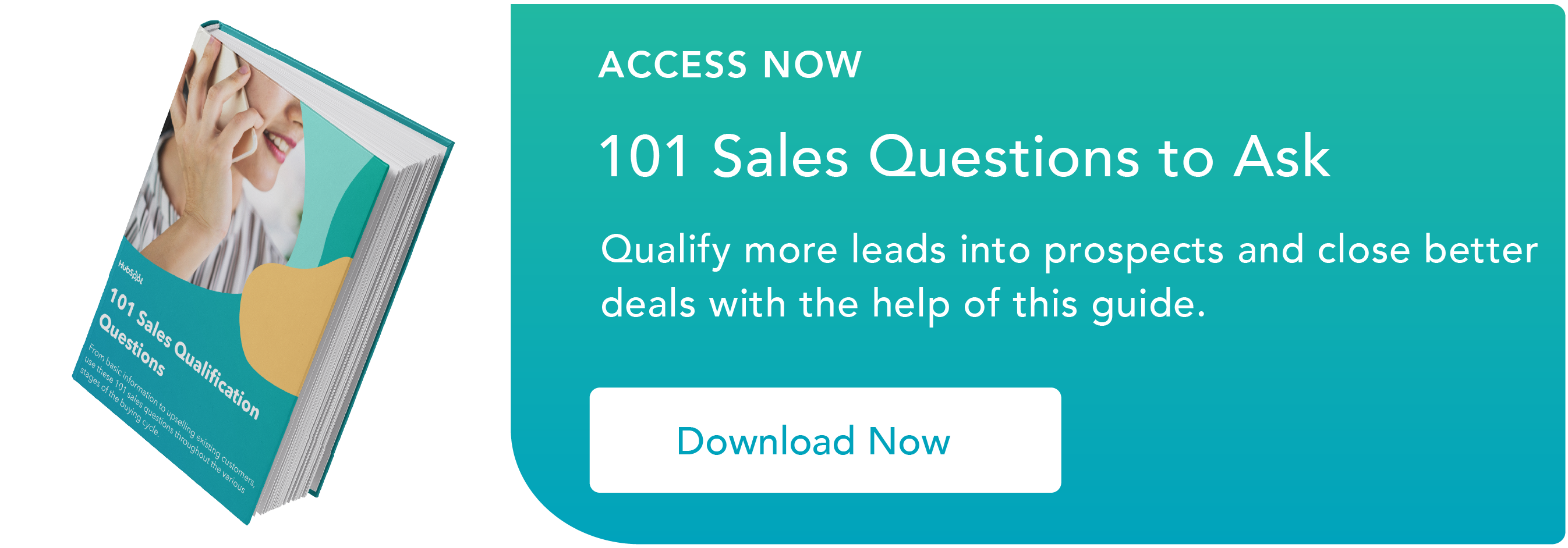Effective sales qualification allows for well-informed, consistently successful sales — on both individual and broader organizational levels. It's central to putting salespeople in touch with prospects who will be receptive to their efforts and ultimately inclined to buy.

But standard qualification techniques aren't always enough to discern productive leads from ones who are bound to go nowhere. Sometimes, you need to think more dynamically and take a more novel approach — and in some cases, those tactics are hiding in plain sight.
To help you out, we’ve spoken to some experts for their sales qualification tips that you can use to nail down leads and close more deals.
1. Assign homework after introductory conversations.
Deanna Povec, VP of Operations at Media Junction, says that an overlooked tactic is assigning homework to leads at the end of your conversations. She says “If I send them a video or read a post, are they invested enough to take 10 minutes to look over them?”
As she says, if a lead takes the time to look over this information, it’s probably safe to say that they’re interested. They care about the potential value you can provide them, and they’re curious to see if the additional information will supplement what you’ve already shared with them.
2. Qualify the business’s needs first.
Mintis Hankerson, HubSpot's Director of Revenue Strategy, says that an overlooked sales qualification tactic is to focus on qualifying the business’ needs first. She thinks that sales representatives often focus on asking “Can you sign by x date?” when they should be asking “When do you need to see results?”
When you ask this question, the lead's response will help you understand the severity of the business need and how eager they are to obtain a solution. You can prescribe a start date and ask if the timeline is achievable, and any hesitancy will let you know that they may not be ready to commit to a solution yet.
Hankerson says “If you qualify for the business need that is leading to a purchase you ensure that the prospect has the same urgency and priority level on making a purchase to solve their business pain.”
Essentially, by giving them a set start date you’re letting them know that you’re ready to proceed with next steps. If they aren’t yet ready to buy and are still in the decision stage, you’ll likely sense uncertainty on their side or they’ll simply say “No that doesn’t work for us.”
3. Reference previous conversations.
As nice as it would be, deals aren’t usually closed after one single conversation with a lead. However, the length of your conversation cycle is actually a valuable tool for qualifying your leads.
If you reference parts of previous conversations when speaking with prospects, you can get a sense of how they’ve retained information, what has (or hasn’t) resonated with them, and whether they’ve put additional thought into your conversation. If they haven’t retained much, or display signs of not understanding your first conversation, it might be a clear indicator that they aren’t as serious as you are.
Povec says that, when she uses this strategy, the goal is to see if they can effectively regurgitate how HubSpot can help them. If they can’t do this, she says “It might be a clear indicator that they are not ready yet and it might be time to part ways.”
4. Conduct pre-research.
Pre-research is the opposite of qualification tactics like cold calling. Rather than reaching out to prospects you’ve never had contact with and don’t know anything about, it involves uncovering all possible information you can get on a specific lead before making contact.
Povec, says "Doing pre-research by asking yourself questions like ‘Does the company fit the mold of our target audience?’ If yes, I can confidently make a call and know that the conversation will be more of a discussion of how I can help their business, rather than a bit of an educational phase."
Doing this gives you a segue into a conversation with a customer and, rather than pitching to them from position zero, you already know about their business and how you can serve them.
You can make a compelling case to the prospect you’re calling, emailing, or visiting at their place of work. You already know that you have something of value to offer them — more specifically, you’re not pitching blindly.
Networking is a common strategy for acting on the information you’ve collected during pre-research. It’s a form of sales canvassing, and it typically occurs at events that salespeople attend because they know prospective customers will be there. If there’s a guest list available, obtaining this information beforehand can help you prepare for potential customer interactions.
5. Leverage social media.
Social media can likely be used by all teams within your organization, from customer service to sales. Like the tip mentioned above, working with your marketing teams can help you use social media as a means of prospecting. One of the strategies worth considering is called social listening.
Social listening is the process of monitoring your business’s social media channels, and different channels in general, for mentions of brand-related keywords, topics, or mentions of competitors.
By doing this, you can create lists of those who are actively engaging in conversations about your business — these people may be future customers. You’ve pre-qualified them as potential leads, and seeing their tweets is a form of warm outreach that gives you an understanding of who they are before you initiate further contact.
6. Ask customers about their frustrations.
Asking customers about their pain points gives valuable information about the needs they’re hoping to get addressed. Asking customers about their frustrations provides more information than just their pain points — it gives specific insight into what is frustrating them about their current solution and the challenge they’re hoping to solve.
You can think of it like this: a customer can tell you that their current pain point is a long and drawn-out marketing process that they’d like to streamline. This is great information, and you can easily position your software as an all-in-one solution. However, asking them about their frustrations may give you more insight into the specifics of what’s bothering them, rather than an overarching understanding.
When you delve deeper into their pain points and understand their frustrations, you’ll uncover the minute details of their current challenges. This makes it easier to qualify your leads and position your product as a solution to their specific, individual needs.
7. Get them to explain their history.
Every qualification conversation is the end result of some sort of sequence — a chain of events that brought a lead to you. That's why asking leads about their past actions can be a massive help. Doing so sheds light on whether they fit your buyer persona, allowing you to meet them at their stage of need.
For example, asking the question, “Have you ever tried to solve your problem before?” gives insight into how serious their pain points are and if they have a current solution in place.
If they respond to this question and say that they have never tried to address their needs before, they may be looking for solutions from other companies as well — in that case, you wouldn‘t qualify this lead as ready to buy and pitch a deal because they likely haven’t made concrete, final-stage decisions.
If that lead comes across a better solution, they might not pan out — so you wouldn't want to prioritize that relationship and possibly waste your time.
However, if a lead tells you that they have tried to address their needs before and switched between multiple different services, you get a more holistic view of their history. They’re likely in need of an immediate solution, and understanding the reasons why they’ve moved between solutions lets you know the specific attributes they’re looking for and what you’ll use to sell them on your tool.
Diversify Your Qualification Strategy
All in all, the process of qualifying leads is a pillar of successful selling. Without knowing who your customers are and if they’re even likely to buy from you, creating a thoughtfully tailored, effective sales strategy for them becomes impossible.
These tips from HubSpot experts can give insight into high-quality sales qualification tactics that will allow you to succeed in your processes and close more deals.
![Free Download: 101 Sales Qualification Questions [Access Now]](https://no-cache.hubspot.com/cta/default/53/e97d6603-b40e-4085-ad55-0074b7351ead.png)

![21 Signs Your Buyer Is a Poor Fit [Sales Process Checklist], According to HubSpot's Former Sales Director](https://blog.hubspot.com/hubfs/Bad fit checklist.jpg)





![What a Client Intake Form Is & What It Should Look Like [Template]](https://blog.hubspot.com/hubfs/CLIENT INTAKE FORM (1).jpg)


